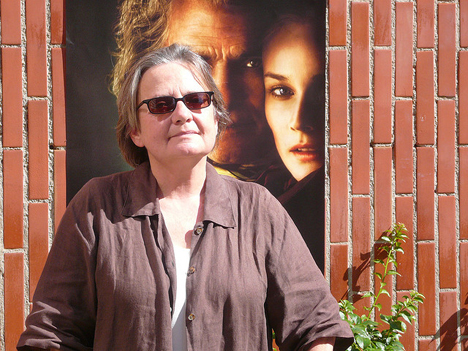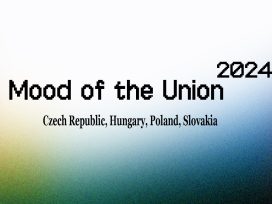
The crux of different peoples’ history, and of humanity as a whole, is always food and hunger. In the final analysis, it’s the stomach that counts.
Film director Agnieszka Holland considers the anti-gender campaign of the Roman Catholic Church in Poland a political attempt to cover up the Church’s own problems; and contends that being a white, heterosexual, conservative Catholic Pole cannot be the only respectable way of living.
Lukasz Pawlowski: What is your interpretation of the Polish gender dispute? Just a few months ago, the word “gender” was hardly a subject of debate among the wider public. Suddenly a discussion about its meaning has exploded with great force.

Agnieszka Holland, Institut Francés de Barcelona, 3 October 2006. Photo: Jordi Motlló. Source:Flickr
Agnieszka Holland: The reasons behind this explosion are political. The Roman Catholic Church invested a lot of effort in launching its “anti-gender” policy as an ideological campaign with which to cover up certain issues. The Church brought this debate into the mainstream and made it incredibly heated, aggressive and dangerous.
LP: Do you think this problem was created artificially?
AH: In its current shape, yes. However, the anxieties and fears stemming from rapid changes in morality and how gender roles function in Western societies are perfectly real, and certainly not fabricated. The difficulty is that by boiling these problems down to an aggressive witch-hunt against particular groups (that is, homosexuals, leftist liberals or feminists), it is impossible to engage in any kind of factual analysis or debate. The radicalization of language leads to an absurd ideological war, which – in my opinion – is now unavoidable. Instead, we need an honest examination of these phenomena, we must explain and discuss them.
LP: Is the division into “different Polands” deepening?
AH: It would seem so. I very much appreciate the calm courage and intellectual honesty of Agnieszka Kozlowska-Rajewicz, the minister for equality, and I admire her respect for all parties involved in this dispute. At the same time however, I hold a grudge against the government, the opinion-forming circles, those in education and the public media due to the fact that they refuse to build a shared platform as a basis for explaining, analysing, connecting and familiarizing people with the fact that today’s world is not homogenous; that being a white, heterosexual, conservative Catholic Pole is not the only respectable way of living.
LP: Let’s imagine that the dispute had never broken out with such force and caused such strong emotions. How should this discussion be led? What would you say, to a conservative or a strongly Catholic person, that the gender debate should be about?
AH: I would talk to them about the issues I myself perceive as dangers in the blurring of gender roles, the revolutionary changes that ways of performing these roles are currently undergoing: what is the situation for men, and what is the situation for women in view of these issues? What does it mean for the family and procreation? What are the consequences for people’s identities and the possibility of forming fulfilling relationships? How can patchwork or non-heterosexual families function alongside traditional families? This is an incredibly complex and hugely interesting problem that should be analysed by sociologists, philosophers, anthropologists and pedagogues. By being able to understand what is happening around us, we will be able to deal with it better.
LP: What threats do you see in relation to the blurring of gender roles?
AH: For many centuries, a particular family model existed in our culture. Female and male roles were strictly defined. Suddenly all of this began to change, which certainly disrupted a sense of order and safety. I am not a Marxist and I do not believe that all social phenomena can be explained solely through economic changes. However, I do believe that the threat of unemployment among men, partly caused by growing female competition on the job market, and partly by the change in production methods, has undermined men’s self-confidence. Suddenly it seems that men can no longer perform the traditional “hunter” role, the role of the one who brings the food home.
Western societies grew accustomed to this change over a number of decades. In post-communist societies, these changes basically took place overnight. Of course, in communist Poland women also worked, but at the same time fulfilled their traditional duties – they cleaned, cooked, looked after children and elderly parents. Consequently, men were still able to play their hunter role. Besides, in the People’s Republic of Poland, the threat of unemployment was markedly lower than in capitalist economies. Once unemployment becomes endemic and reaches the 10 per cent mark, the level of anxiety grows rapidly and the feeling of self-esteem disappears.
In those states where the macho model was very much alive – in the Balkans and the Caucasus – the change of political system led to the outbreak of wars. Men, no longer sure of their hunting roles, were rapidly assuming the roles of warriors. In the same way, rapid changes in Polish morality are dangerous to some degree.
LP: What do you mean by this?
AH: Certain changes reach us due to rapid globalization and therefore precede changes in our mentality, thinking patterns or even economic structures. We see what is happening in other countries without being prepared, through a process of extended, deep social education, for the same to happen to us. Consequently, we view these changes as a caricature, which triggers awkward anxieties – anxieties that, in turn, trigger aggression.
LP: Is Poland undergoing a moral “shock therapy”?
AH: Yes, and the reaction is one of conservative backwardness. The fear of change causes massive social rigidity and the construction of alternative communities and alternative visions of the world.
LP: You divide your time between Poland, France and the USA. How do you see our gender dispute in the context of French and American experiences?
AH: Relatively speaking, Americans are coping with it in the best way possible. On the one hand, they are a fairly traditionalist society (this is illustrated, for example, by the portrayal of sex in films). On the other, values such as freedom and equality are a vital element of their national identity. For centuries now they have been working through their diversity and the coexistence of very different groups in a single community. Creeds, races and countries of origin are all different. Of course, even in the USA there are extremely conservative communities, and racism and anti-Semitism have not completely disappeared. All in all, American shifts in morality are more rationalized and make up a broader phenomenon of tolerance towards the other. There are certain higher values most Americans relate to and which allow for the coexistence of diverse groups and diverse life choices.
In America, no one would have come up with the idea of changing the colours of the rainbow and painting it white and red. For me, this rainbow symbolizes Polish fear, which relates not only to morality, but also to all forms of otherness and diversity in the world. The deeply rooted complexes of Poles do not allow them to confront any kind of serious problem. Obviously, I only speak of some trends, and not of all Polish people.
LP: On the other hand though, Poles increasingly travel abroad, many of them work abroad, and western media and ideas are more visible in Poland. It is said that we are more open but that, at the same time, conservative reactions are very strong. Could this be testimony to some sort of a paradox, or do these phenomena simply refer to different parts of our society?
AH: I would not overestimate the significance of travelling abroad. Only a small proportion of Polish immigrants who work in England for example, integrates into that society and begins to understand it. They lack the contact that would allow them to overcome the feeling of otherness, the feeling that causes our various complexes to become more pronounced abroad. The Polish community is a community that does not feel at ease in foreign countries and has the tendency to shut itself away in protective enclaves. The most nationalistic or racist views I have ever come across amongst Poles were those of Polish communities in the USA, Canada and Germany. The notion of Poles travelling the world and melting in with it like a sugar cube in a cup of hot tea, or gaining knowledge, tolerance and respect for others from these experiences is simply not the case in reality. Unfortunately, often quite the opposite happens. They leave and take their homeliness with them. And if they lose it, because their Catholicism and patriotism are in fact rather shallow, they find themselves surrounded by a feeling of emptiness. As a result, they refer back to the most primitive anchors, which certainly do not include openness.
LP: But conservatism is not an exclusively Polish problem. In France, the decision to legalize single-sex marriages and adoption rights for gay people caused widespread protests.
AH: At the moment, many western societies are very divided. Americans have their Tea Party and Republicans, who are becoming increasingly extreme in their conservatism. This is to do with these rapid societal changes, which a majority of various societies perceive as an adulteration of their system of values. It would be rather strange if there had been no protest at all.
On the other hand, around 7,000 gay and lesbian couples got married in France last year and all of this passed by incredibly peacefully. What I mean is, there were no protests or armed groups or anything like that. Homosexual couples are totally accepted by those around them. It turns out that if some formal or legal change in the situation of gays and lesbians, or any other minority group, takes place, after a while people get used to it, and they also accept it, because they can see that this change does not pose any threat to them. The lies and the fears surrounding a particular group gradually lose their force.
When we look at the last few hundred years of our history, we see how successive groups of social pariahs have become part of the democratic mainstream. It began with tenant farmers, then we had the emancipation of African Americans in the US and, finally, women. Women’s emancipation was actually the biggest problem, because it deeply affected not only social relations, but also family relationships. The fear of changes in social or familial life triggered by the changing roles that women perform and the aggression caused by these changes are much harder to overcome. The next group is homosexuals – their emancipation also causes strong opposition, because it touches very intimate areas of taboo and sexual fears.
LP: One of the arguments used by those who oppose any discussion of cultural gender roles is very liberal in its essence: they claim that this discussion is an inadmissible interference of the state in a private matter – that of raising children and negotiating relations between partners in a relationship. They argue that “the way I raise my child should be decided by me as a parent”.
AH: This is a false argument, because it is based either on a misunderstanding or a lie. Equal upbringing is not about convincing children to change their gender roles. It is aimed at presenting the existing diversity. A similar argument could be used by creationists, who could say they did not want their children to study biology or anthropology at school. This leads to an absurd situation. The role of a school is not indoctrination, but explaining the complexities of the modern world so that children who are born into this world are able to understand it. If moral changes are happening all around us, then closing our eyes to them is simply unintelligent.
LP: You mentioned economic and moral factors that trigger conservative reactions. But these do not explain why the gender discussion in Poland actually boils down being only about sex. Very few people speak of the demands for equal treatment of women and men in, say, the workplace. Much more time and energy is spent on scaremongering about changes in sexual habits.
AH: This discussion was imposed by the Roman Catholic church, which – especially in Poland, though not only – focuses excessively on sex.
LP: How can this be explained?
AH: There are numerous explanations, but I wouldn’t want to go into it. Since sex has always been taboo for the church and the question of the sex lives of Catholic priests has been this double taboo, perhaps we can understand why it is that these most painful matters raise such passionate discussion. Indeed, this seems to be the dominant subject. Pope Francis tried to calm the issue but has not been very successful so far, due to the fact, I think, that this focus on sex is actually genuine – the church really does seem to be obsessed about it. Paradoxically, if we view the world solely from this perspective (the heavy focus on sexual matters), then the spiritual aspect of the moral changes that we have discussed disappears completely, and the entire functioning of social life is brought down to its sexual dimension. This, however, cannot be what the church is about.
Published 28 March 2014
Original in Polish
Translated by
Ben Borek, Natalia Janota
First published by Kultura Liberalna 263, 4/2014, 21 January 2014 (Polish version); Eurozine (English version)
Contributed by Kultura Liberalna © Agnieszka Holland, Lukasz Pawlowski / Kultura Liberalna / Eurozine
PDF/PRINTSubscribe to know what’s worth thinking about.

The crux of different peoples’ history, and of humanity as a whole, is always food and hunger. In the final analysis, it’s the stomach that counts.

Since the war in Ukraine, the Visegrád Four group no longer articulates a common voice in the EU. Even the illiberal alliance between Hungary and Poland has come to an end. Yet in various ways, the region still demonstrates to Europe the consequences of the loss of the political centre.